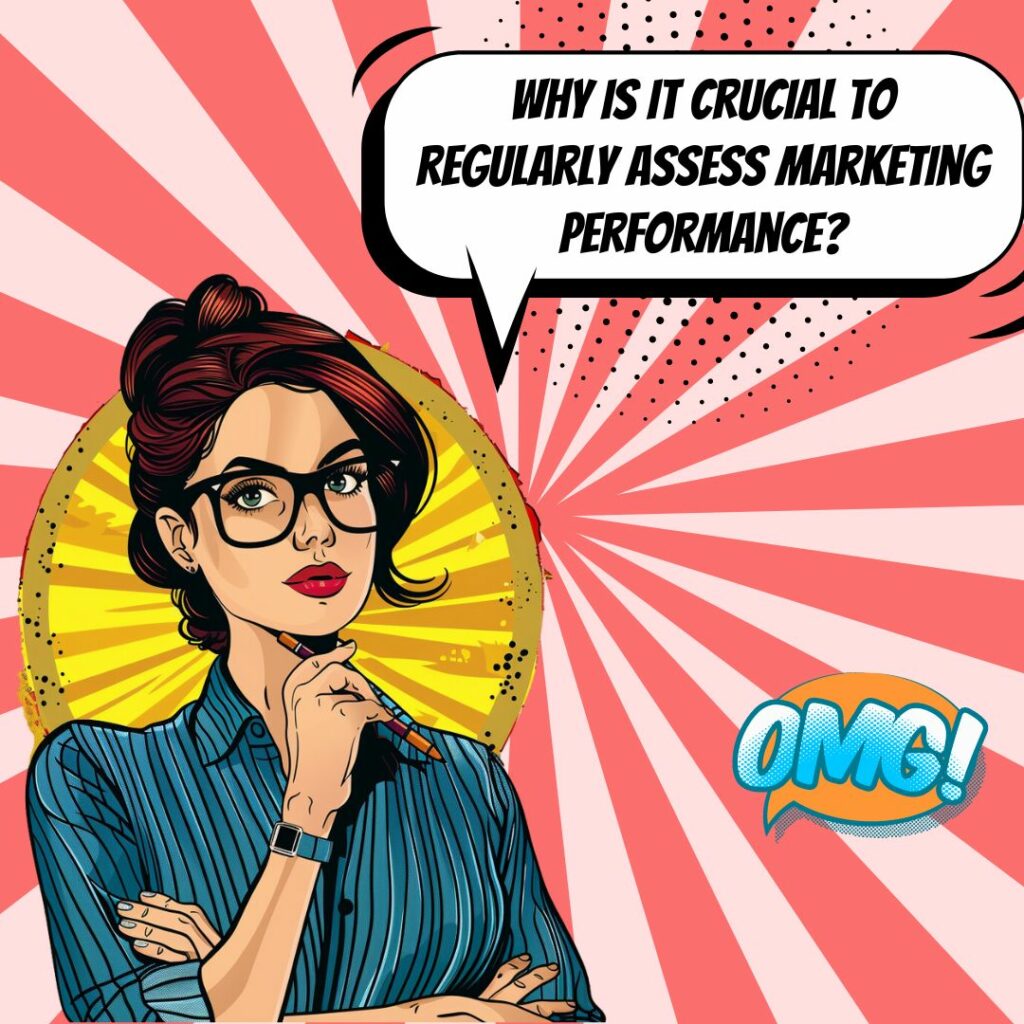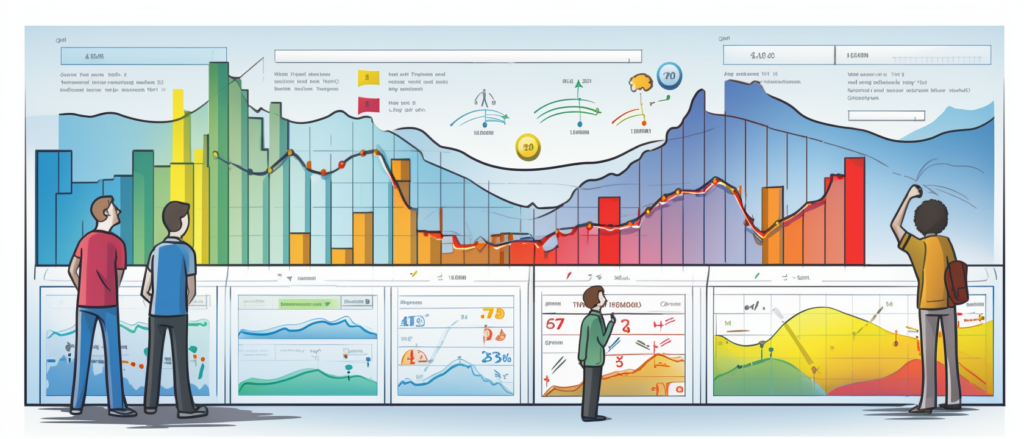Key Takeaways
✅ Setting Clear Objectives: A laser-focused approach to outlining your goals is foundational to assessing marketing performance, ensuring every campaign is calibrated to support your overarching business vision.
✅ Analyzing Data and Metrics: Dive deep into the data that illuminates the health of your marketing endeavors, gleaning insights from your campaigns’ conversion rates to the intricacies of customer acquisition costs.
✅ Continuous Improvement through Regular Reviews: Embrace an ethos of perpetual evolution, routinely scrutinizing your marketing strategies to relentlessly pursue peak performance and transcend industry benchmarks.

Introduction
Eager to skyrocket your revenue but find it hard to quantify the bang for your marketing buck? Why settle for ambiguity when you can achieve clarity? Assessing current marketing performance is no longer just a best practice—it’s a vital part of your business’s success story. This comprehensive guide is your torch in the data labyrinth, illuminating clear pathways to growth and profitability.
By marrying cutting-edge analytics with insightful strategies, we’ll demystify the metrics that matter and equip you with the tools to launch your campaigns into stratospheric success. Here, we unbox the toolbox for modern marketers to achieve and measure tangible results. Expect not only to learn but to master the art of translating data into actionable insights, ensuring you’re not just running in the race but leading the pack.
Get ready to peel back the curtain on the most sought-after industry secrets, empowering you to sharpen your strategies, elevate your engagement, and drive enviable ROI. Hold on to this guide—as your compass to marketing excellence, we promise actionable insights that are not just transformative but revolutionary in navigating the ever-evolving e-commerce landscape.
Top Statistics
| Statistic | Insight |
|---|---|
| Global Digital Advertising Spending: Digital ad spending worldwide reached $456 billion in 2021. (Source: eMarketer) | This staggering number signifies the mass migration of advertising dollars to digital, urging brands to optimize their online presence to capture this growing market. |
| Video Content Popularity: 86% of businesses use video as a marketing tool. (Source: HubSpot) | Video content’s overwhelming popularity implies that incorporating it into your marketing strategy could significantly boost engagement and conversion rates. |
| Influencer Marketing Effectiveness: Influencer marketing is expected to reach $15 billion in 2022. (Source: Insider Intelligence) | Tapping into influencer marketing can be a game-changer for brands looking to build trust and reach with their target audience. |
| Email Marketing Performance: The average email open rate across all industries is 21.33%. (Source: Litmus) | This benchmark is a call to action for marketers to craft compelling subject lines and content to stand out in their customers’ inboxes. |
| SEO Importance: 75% of users never scroll past the first page of search results. (Source: SEO Tribunal) | This statistic underscores the importance of ranking on page one of search engines, highlighting the necessity for a solid SEO strategy. |
Setting Clear Goals and Objectives
To effectively assess your marketing performance, it’s crucial to set SMART goals. These goals should be Specific, so you know exactly what you’re aiming for; Measurable, to track progress quantifiably; Achievable, to ensure they can be reached; Relevant, to align with your business’s larger objectives; and Time-bound, to have deadlines for accountability. With your goals locked down, forge a link between your marketing strategies and the overall business goals for a unified direction. Establish derivative Key Performance Indicators (KPIs), which act as beacons, illuminating the path and tracking your journey’s progress.
Analyzing Key Metrics and Data
Grasping key metrics provides clarity on the health and impact of your marketing strategies. Conversion rates, customer acquisition costs, and ROI offer a window into effectiveness and efficiency. Leverage powerful analytics tools such as Google Analytics for digital footprint tracking, social media insights for engagement analysis, and CRM data for customer behavior patterns. The skill lies in interpreting the data collected, distilling action from volumes of information to continuously optimize marketing efforts.
Conducting Customer Feedback Surveys
Implementing customer feedback surveys bridges the gap between perception and reality. Design surveys that not only measure satisfaction but also uncover the ‘why’ behind the data. Apply this feedback to fine-tune your marketing approaches. The Net Promoter Score (NPS) is a potent gauge of brand loyalty and a predictor of growth potential, an invaluable inclusion for benchmarking customer sentiment and shaping customer experience strategies.
Monitoring Competitors and Industry Trends
Market landscape awareness is pivotal. Closely monitor competitors’ marketing moves and realize when they shift tactics. Be versed in the latest industry trends and best practices to ensure your strategies remain relevant and compelling. Use competitive intelligence not just reactively but as a proactive tool to sharpen your marketing tactics and value proposition.
Evaluating Return on Investment (ROI)
ROI reigns supreme in validating your marketing spend. It necessitates precise calculations of both revenues and expenses linked to individual campaigns and channels. Pinpoint which endeavors are yielding dividends and which are costly experiments. With this lighthouse of data, redirect your marketing budget to optimize for both short-term effectiveness and long-term growth.
Continuous Improvement and Adaptation
In the e-commerce realm, continual strategy evolution is non-negotiable. Harness performance assessments not as report cards but as launchpads for strategy refinement. Cultivate an environment where experimentation is encouraged and failures are springboards for learning. Keep an eye out for emerging technologies and inventive tactics, ensuring your e-commerce presence is not just current, but cutting edge and competitive.
Inspirational Quotes
1. “Marketers need to build digital relationships and reputation capital. It’s no longer just about who you know, but what you share.” – Brian Solis
Brian Solis enlightens us with the changing dynamics of marketing in the digital age. It’s not enough to just have connections; marketers must actively curate and distribute content that adds value, engaging with their audience to forge trust and legitimacy crucial for brand growth.
2. “Marketing is no longer about the stuff that you make, but about the stories you tell.” – Seth Godin
Here, Seth Godin, a titan in thought leadership, teaches us that in the saturated markets of today, the differentiation factor lies within the stories brands narrate. Telling a story that captivates and connects is an art form that when mastered, can significantly amplify marketing efficacy.
3. “The only way to win at content marketing is for the reader to say, ‘This was written specifically for me.'” – Jamie Turner
Jamie Turner hits the nail on the head, shedding light on the golden rule of content marketing: personalization. He reminds us that content must resonate on a personal level; it’s about crafting messages that speak directly to the reader’s needs and interests, thereby winning not just their attention but their loyalty too.
AI Marketing Engineers Recommendation
Recommendation 1: Implement Customized Dashboards for Real-Time Analytics: To truly gauge the pulse of your marketing performance, it’s critical to move beyond static reports and embrace custom dashboards that offer real-time analytics. Platforms such as Google Data Studio or Tableau allow you to integrate data from various sources, providing you with a holistic and up-to-date view of your marketing efforts. This enables you to make data-driven decisions swiftly, optimizing campaigns on the fly, and thereby seeing an increase in ROI. According to recent studies, marketers who use advanced analytics are 56% more likely to enjoy higher revenue growth.
Recommendation 2: Leverage Predictive Analytics to Anticipate Consumer Behavior: As we dive deeper into the era of big data, predictive analytics become a cornerstone of effective marketing performance assessment. By harnessing machine learning algorithms and AI, you can predict customer behavior, identify trends, and foresee market changes. This strategic insight not only allows you to be proactive in your marketing strategy but also to personalize customer experiences at scale, which is paramount today. In fact, Emarsys reveals that 81% of consumers want brands to understand them better and know when and how to approach them.
Recommendation 3: Utilize A/B Testing for Continuous Optimization: The importance of A/B testing can’t be stressed enough in the context of assessing marketing performance. Tools like Optimizely or Google Optimize make it relatively straightforward to experiment with different versions of your website, advertisements, or emails to determine what resonates best with your audience. This practical application is essential because it relies on actual user response rather than assumptions. Optimizing your marketing collateral based on these results can significantly enhance engagement rates and conversion – Adobe’s Digital Intelligence Briefing reported that companies that A/B test their emails see a 37% increase in responses compared to those who do not.
Conclusion
Evaluating Return on Investment (ROI) will remain your steadfast indicator of success, telling the tale of where to double down or tactically withdraw your marketing spend. Through ongoing customer feedback surveys and keeping a finger on the pulse of industry movements, the capacity to adapt and innovate is now a requirement, not a luxury, in the fast-paced world of e-commerce.
Remember, your competitors are not just indicators of where the bar is set but also sources of invaluable insights that can pivot your strategies from good to exceptional. Continuous improvement is not just a catchphrase; it’s the heartbeat of a thriving, resilient brand.
By embracing these actionable insights, you are not only ensuring the stability of your current standing but planting the seeds for exponential growth and innovation in your marketing strategies. Be emboldened by the success stories that have emerged from steadfast attention to marketing performance and become one such narrative. The future beckons with the promise of what data-driven decision-making in marketing can yield.
Harness the full spectrum of analytical tools, insights, and strategic foresight detailed within this guide to elevate your business. Let the march towards marketing excellence begin today, informed by performance assessment and propelled by unbridled ambition. There’s no greater time than now to invest in understanding the intricacies of your marketing performance – your business will thank you for it.
FAQs
Question 1: What is marketing performance assessment, and why is it important?
Answer: Marketing performance assessment is the process of evaluating the effectiveness and efficiency of marketing strategies and tactics to achieve business goals. It’s essential to understand what’s working, what’s not, and where to optimize to improve ROI and drive business growth.
Question 2: What are the key metrics to measure marketing performance?
Answer: Key metrics include website traffic, conversion rates, customer acquisition cost (CAC), customer lifetime value (CLV), return on ad spend (ROAS), engagement rates, and customer satisfaction scores.
Question: 3. How can I set realistic marketing performance goals?
Answer: Set SMART (Specific, Measurable, Achievable, Relevant, and Time-bound) goals by analyzing historical performance, industry benchmarks, and competitor data. Involve cross-functional teams, including sales and finance, to ensure alignment with business objectives.
Question 4: What is the role of market research in assessing marketing performance?
Answer: Market research helps identify target audience preferences, competitor strategies, and industry trends. It provides insights to inform marketing strategies, measure performance, and make data-driven decisions.
Question 5: How can I track and analyze marketing performance data?
Answer: Use marketing analytics tools like Google Analytics, HubSpot, or Marketo to track and analyze performance data. Create dashboards to visualize key metrics, set up automated reports, and use data to identify trends, correlations, and areas for improvement.
Question 6: What is the difference between short-term and long-term marketing performance metrics?
Answer: Short-term metrics (e.g., website traffic, conversion rates) help evaluate immediate performance, while long-term metrics (e.g., CLV, customer retention) measure the overall health of the business and the effectiveness of marketing strategies over time.
Question 7:. How can I use customer feedback to assess marketing performance?
Answer: Gather customer feedback through surveys, social media, and customer support channels. Analyze feedback to understand customer needs, preferences, and pain points. Use insights to optimize marketing strategies, improve customer experience, and increase customer retention.
Question 8: What are some common challenges in assessing marketing performance?
Answer: Common challenges include data silos, inaccurate or incomplete data, inconsistent metrics, and a lack of alignment between marketing and business objectives. Address these challenges by implementing data management best practices, setting clear performance goals, and fostering cross-functional collaboration.
Question 9: How can I use A/B testing to improve marketing performance?
Answer: A/B testing allows you to compare the performance of different marketing elements, such as email subject lines, landing page designs, or ad copy. Use A/B testing to optimize marketing tactics, improve performance, and drive better results.
Question 10: What is the importance of continuous improvement in assessing marketing performance?
Answer: Continuous improvement is key to staying competitive and driving business growth. Regularly assess marketing performance, identify areas for improvement, and implement changes based on data insights. This iterative process helps optimize marketing strategies and drive better results over time.
Academic References
- Farris, P., Bendle, N., Pfeifer, P., & Reibstein, D. (2018). Marketing Metrics: The Definitive Guide to Measuring Marketing Performance. This seminal book delivers an exhaustive repository of over fifty marketing metrics, providing business professionals not just a compendium of data points, but also an analytical lens to evaluate marketing performance. The publication underscores the importance of empirical evidence in strategic marketing decision-making and furnishes actionable guidance for the scrutiny and interpretation of these pivotal metrics.
- Fornell, C., Johnson, M.D., Anderson, E.W., Cha, J., & Bryant, B.E. (2006). The Role of Customer Satisfaction in Acquiring, Retaining, and Recovering Customers. The American Behavioral Scientist, 49(7), 1031–1049. This incisive article navigates the influential domain of customer satisfaction and its cardinal role in assessing marketing performance. The insightful research delineates the compelling correlation between customer contentment and loyalty, repetitive purchases, and peer recommendations, affirming that customer elation remains at the heart of business prosperity.
- Kaplan, R.S., & Norton, D.P. (2013). The Marketing Performance Measurement Manifesto. Harvard Business Review, 91(7/8), 108–114. This authoritative article introduces the transformative Marketing Balanced Scorecard, a tool that aligns marketing ambitions with the broader organizational mission. The manuscript outlines a multi-dimensional approach to measurement across financial, customer, process, and development spectrums, yielding a comprehensive view of marketing performance and strategic orientation.
- Homburg, C., Hahn, M., & Krohmer, H. (2012). Marketing Performance Assessment: A Review and Reconceptualization. Journal of Marketing, 76(5), 117–135. This thought-provoking article critically examines the landscape of marketing performance assessment and heralds a refreshed, all-encompassing framework. Bridging financial, customer-oriented, and internal perspectives, the study emphasizes the necessity for a synergistic approach to interpreting marketing efficacy, advocating for integrated strategy formulation and outcomes assessment.
- Hult, G.T.M., Hurley, R.F., & Knight, G.A. (2004). The Impact of Marketing Capabilities on Firm Performance. Journal of Marketing, 68(4), 1–17. Spotlighting the strategic leverage of marketing capabilities, this pioneering study examines key proficiencies including customer insights and brand management, emphasizing their consequential impact on firm performance. The article lends profound insights into the cultivation and management of these competencies, framing them as instrumental in the repertoire of successful marketing performance.













